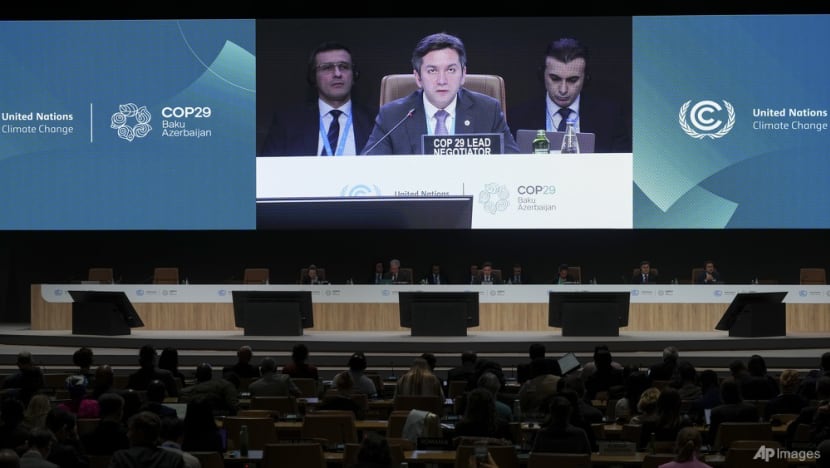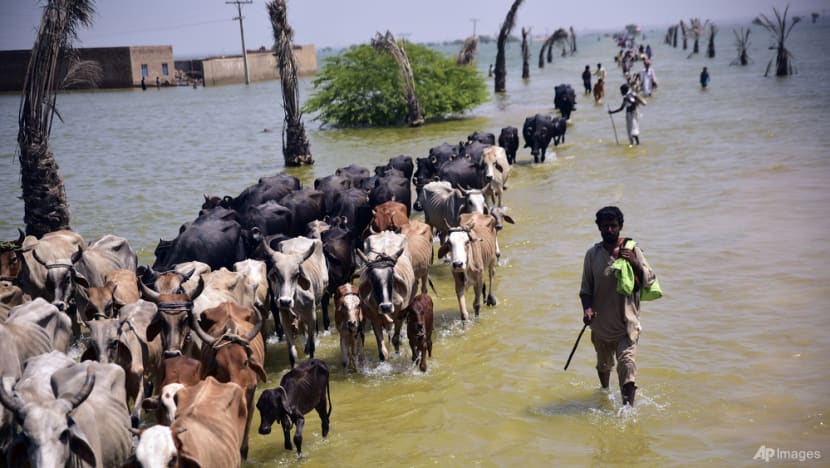How significant is the US$300 billion COP29 climate deal for developing countries?
The final agreement requires developed countries to help poorer nations mitigate the impact of climate disasters through financing.

Yalchin Rafiyev, Azerbaijan's COP29 lead negotiator, speaks during a plenary session at the COP29 U.N. Climate Summit, Thursday, Nov. 21, 2024, in Baku, Azerbaijan. (AP Photo/Peter Dejong)

This audio is generated by an AI tool.
Over the past weekend, nearly 200 countries concluded the annual United Nations-led climate summit with a financing goal of at least US$300 billion for developing nations per year by 2035.
The deal, which was struck in overtime at the two-week COP29 conference in Azerbaijan’s capital Baku, attracted brickbats from its intended recipients as being “woefully inadequate”.
While the agreement marks a boost of US$200 billion from the previous deal, it falls far short of the US$1.3 trillion sum that poorer nations were pushing for.
Climate experts echoed this criticism, saying US$300 billion pales in comparison to other expenditures that affect climate change.
“While US$300 billion is not a trivial amount of money per year, if we could compare it with, say, the estimates for fossil fuel subsidies that countries are paying – that’s basically US$7 trillion a year,” said Mark Howden, director of the Australian National University’s Institute for Climate, Energy and Disaster Solutions.
“So, we're paying huge amounts to dig up these fossil fuels and to emit them into the atmosphere, and we're prepared to only pay a very small proportion of that in terms of compensation for the damage that's done,” he told CNA938 on Monday (Nov 25).
Scientists have said 2024 is set to be the hottest year on record, with both developing and developed countries experiencing extreme weather events this year.
Paul Bledsoe, a former White House climate advisor, pointed out that climate change will cost the world trillions of dollars every year by 2035.
“If we do not begin cutting methane and other emissions, the amount of money will never be enough to deal with the climate change impacts that are headed our way,” added the lecturer at the American University’s Center for Environmental Policy.
Related:
“DIFFICULT” DYNAMICS
In terms of what the COP29 deal signals about the dynamics of climate financing for wealthy nations and the world’s most vulnerable countries, Howden summed it up as “difficult”.
“Clearly, you’ve got a situation where there's a whole bunch of people who are seeing the damage that climate change is doing, and will do more of, in the future,” he said.
“(They’re then) saying that historically, there's a … relatively small group of countries who have been causing the bulk of that damage, and they are looking for some degree of recompense for that, or adjustment costs being paid.”
Poorer nations have said they have been left to their own devices to handle climate disasters like storms, floods and droughts.

Some delegates from developing countries and island nations temporarily walked out of the negotiation room in protest on Saturday (Nov 23), saying the offer on the table was unacceptable.
When the deal was clinched on Sunday, some criticised wealthy nations for not doing more. The Indian delegation representative called it “nothing more than an optical illusion” that would not address the real climate challenges.
But UN climate chief Simon Steill hailed the outcome as an insurance policy for humanity.
GREENHOUSE GAS EMISSIONS STILL RISING
The experts also expressed disappointment at the lack of concrete emissions reductions from major countries.
Bledsoe, who was climate advisor under former US president Bill Clinton, noted that 10 years after the Paris Agreement was adopted, the world has not met the treaty’s target of limiting the rise of global temperatures to 1.5 degrees Celsius above pre-industrial levels.
According to the 2024 UN Emissions Gap report, the world is currently on track to warm by as much as 3.1 degrees Celsius by the end of this century. Global greenhouse gas emissions and fossil fuel use have continued to rise.
Bledsoe told CNA’s Asia First that in particular, the world is nowhere near reducing methane emissions, which he called a “super pollutant” that is 80 times more powerful than carbon dioxide.
“China held, with the United States, a summit on methane and yet, three years after promising a methane reduction plan, (there have not been) methane cuts,” he said.
China’s emissions alone have surpassed those of the developed world combined, added Bledsoe.
Howden said while several developed countries have been significantly reducing their greenhouse gas emissions, many others are doing the opposite.
“That’s why, overall, our carbon dioxide emissions this year are likely to be the highest on record,” he warned.
Bledsoe said the world must subsidise clean energy technologies for the Global South, particularly economies like India with “very fast-growing emissions”, as well as focus on near-term temperature increases.
“There are dozens of other natural systems that are stressed to the point that they will become net-warming contributors,” he said.
“We are incredibly close to tremendously dangerous global conditions, and that means that all nations have to reduce their emissions as quickly as possible.”
WHAT’S ON THE COP30 AGENDA?
Looking ahead to next year’s COP, hosted in Brazil, Howden said revisiting commitments to reduce greenhouse gas emissions should be at the top of the agenda.
In early 2025, countries will have to submit their national commitments on emissions reductions and adaptation.
“There will hopefully be further stepping up in the next COP of these emissions reductions,” said Howden.
“Those sorts of gains which were made in the previous COP didn’t seem to be continued because of resistance by some countries in this (year’s COP) – that’s the phasing out of fossil fuel-type language. I think there’s a prime sort of need to revisit that.”
He also noted that Brazil will have “a very interesting role” in COP30, given that it is a major player in terms of carbon sequestration as well as producing fossil fuel.
“There’s tensions across those different domains that Brazil encompasses, and so I think it will be a very interesting COP and hopefully, one that makes more progress than (this year’s).”














